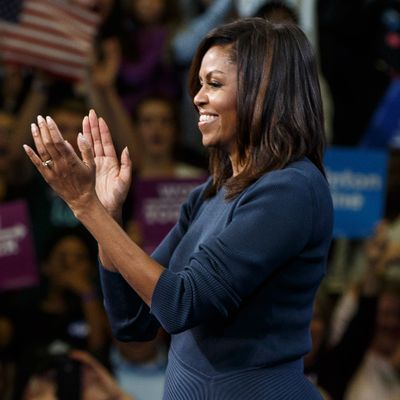
In this historic year for women in presidential politics, the most unapologetic and powerful feminist speech of the campaign was delivered not by the historic candidate but by the First Lady.
Michelle Obama, speaking in the swing state of New Hampshire, delivered the half-hour talk with furious precision. It was a speech about women — the woman running for the presidency, and the women around the country who have been badly shaken by the turn this election has taken, as reports have emerged that make very clear how Donald Trump talks and acts with regard to the bodies of women and girls.
It was a speech that Hillary herself could not have given, for a number reasons: In part, because it remains damn near impossible for a woman to make inspiring feminist arguments on her own behalf without coming off as self-congratulatory; in part, because Hillary is hamstrung by the fact that she’s married to a man who has been accused of his own sexual-power abuses; and, in part, because she is simply less comfortable conveying communion, empathy, and inspiration on the stump. But while Hillary could not have delivered it, it was a speech that the country desperately needed.
We needed it because this week has been awful. It has been demoralizing and depressing. Yes, the still largely male, mostly white media population has chewed over horse-race predictions and barely hidden its glee at the sudden unpredictability of the electoral map. But to be a woman this week, even to be a Clinton-supporting woman this week, has not involved the Saturday Night Live–imagined victory-dancing performed by Kate McKinnon. For many women, recent events have recalled trauma, forced us to relive moments of degradation or shame, and brought back that utterly unfair feeling of responsibility, as if provoking an assault or ugly comment was something we had done, something we should feel bad for.
For many of us, the experience of watching Donald Trump’s physically unnerving behavior toward Clinton during the debate, of hearing his predatory words caught on tape, of reading about his octopus hands and probing tongue and insistent grabs at unwilling women, has felt way too familiar. It has returned to us the memories of the guys who stood too close, who loomed menacingly, who made us feel foolish for having been scared, who spoke cruelly or aimed to embarrass us when we didn’t please them, who touched or slipped or rubbed against us without invitation. For many of us, the view of Clinton during the debate — gripping her microphone tightly as an angry man squinted at her from behind, clearly working to stay subdued and keep any sign of anger or fear or humiliation under control — was all too resonant.
Those experiences were resonant for Michelle Obama, too, who knows more about having had to be controlled and subdue her frustrations, about having her body insulted and degraded, about having her every move scrutinized, than most of us will ever be able to imagine. A frank, funny, brilliant woman, Obama was ripped apart during her husband’s 2008 campaign, attacked as too angry, too critical, too disrespectful of her husband in her insistence on having her own opinions. What Michelle Obama has faced as a black woman, of course, is sexism in combination with racism, forces that amplify and complicate each other, doubling and tripling in intensity. And as First Lady she has worked to control her public persona through these destabilizing gales. Her speeches are tightly crafted and often withering, but always presented in a positive, inspirational frame — they are paeans to hope, not to anger or sadness.
Yet here is Donald Trump, who refers to black cities — most often to Michelle’s native and beloved Chicago — as hellscapes, who launched a delegitimizing and racist campaign questioning her husband’s place of birth, and who is unapologetic and cruel in his aesthetic appraisals of women’s bodies and value.
On Thursday, Michelle Obama talked about Trump like she did not care if he or anyone else knew how angry she was. Her voice shook with fury and emotion.
“I think all agree this has been a rough week in an already rough election,” Obama said at the start, pointing to the contrast between this news cycle and the event she had held on Tuesday for Let Girls Learn, her initiative to get more girls around the world into school. At her final Let Girls Learn event, Obama said, the young women spoke of “their hopes and their dreams … and their aspirations,” and about the “unthinkable obstacles” they had faced in their quests to go to school. “I told them they deserve to be treated with dignity and respect,” she said, “and that they should disregard anyone who demeans or devalues them.”
That, she said, “was Tuesday. And now, here I am, out on the campaign trail in an election where we have consistently been hearing hurtful, hateful language about women — language that has been painful for so many of us.” Declining to repeat the language that Donald Trump has used about women, and declining — as she did in her exquisite speech at the Democratic Convention in July — to even refer to him by name, Obama said that the candidate’s braggadocio about his nonconsensual encounters has unmoored her.
“I can’t stop thinking about this,” she said, and here she gave voice to the experiences of the hundreds of people I have heard from this week via email and social media, of the millions of women who have participated in social-media chains about their own experiences with groping, unwanted advances, and outright assault. “It has shaken me to my core in a way I couldn’t have predicted.”
And so, she went on, “while I would love nothing more than to pretend that this isn’t happening, it would be dishonest and disingenuous to me to just move on to the next thing like this was all just a bad dream.” But, she said, she can’t. “I listen to all of this and I feel it so personally and I’m sure that many of you do too,” Obama went on. “The shameful comments about our bodies, the disrespect of our ambitions and our intellect, the belief you can do anything you want to a woman? It’s cruel, it’s frightening. And the truth is that it hurts. It hurts.”
As many have pointed out, while Trump has trafficked in racism and sexism throughout the campaign, the breaking point — the point of recognition for many in the media and many in the Republican Party — was in response to instances of abuse of white women, women whom the white Republican men who distanced themselves from Trump last weekend could identify with as worthy of their concern. But a discussion of sexual coercion with white women at its center provides a perniciously incomplete view of America, where the bodies of women of color have always been more vulnerable to assault, and where women of color have found it harder to get help or report assault thanks to unequal treatment by the criminal-justice system and medical Establishment.
It mattered that Michelle Obama, who is not a white woman, was making sure that it was not just the voices of white women that were being heard and registered on this subject; it mattered that she was describing sexual inequities, harassment, and assault as central to the experience of all women in America.
“It’s like that sick sinking feeling when you’re walking down the street, minding your own business, and some guy yells out vulgar words about your body,” said Obama, “or … the guy at work who stands a little too close, stares a little too long, and makes you feel uncomfortable in your own skin. It’s that feeling of terror and violation that too many women have felt when someone has grabbed them … It reminds us of stories we’ve heard from our mothers and grandmothers about how, back in their day, the boss could say and do whatever he pleased to women in the office, and even though they worked so hard, jumped through every hurdle to prove themselves, it was never enough.”
And now, she went on, here we are, once again experiencing the feelings of revulsion, of shame, and she said, “we’re drowning in it, and all of us are doing what women have always done: We’re trying to keep our heads above water, just trying to get through it, trying to pretend like this doesn’t really bother us. Maybe because we think admitting how much it hurts makes us as women look weak. Maybe we’re afraid to be that vulnerable, maybe we’ve grown accustomed to swallowing our emotions and staying quiet because we’ve seen that people often won’t take our word over his.”
And so she chided those in the media who are “treating this as just another day’s headline, as if our outrage is overblown or unwarranted, as if this is normal … New Hampshire, be clear: This is not normal.”
Obama went on to discuss the impact of this news on children, and on the men and boys in the country “who do not talk to women like this.” She said that “to dismiss it as everyday locker-room talk is to insult decent men everywhere” and told a story about a 6-year-old boy who told his mother that he knew Hillary would be president because he’d heard that “the other guy called someone ‘piggy’ and you cannot be president if you call someone a ‘piggy.’”
“Even a 6-year-old,” said Michelle Obama, “knows that this is not how adults behave, this is not how decent human beings behave.”
And, yes, she made the case for Hillary Clinton in the affirmative, discussing her preparedness, her lifetime of work on behalf of kids and families, her commitment to affordable health care and child care, her dedication to being a team player, as evidenced by her eagerness to work for her former opponent as secretary of State. She described Hillary with respect, as a full and complicated human being — a lawyer, law professor, First Lady, senator, secretary of State, and as a mother, wife, and daughter — a multifaceted, experienced candidate and role model who has “never quit on anything in her life,” who “waited her turn and helped out while waiting” and “who happens to be a woman.” It was a brief and yet more robust and vivid description of a woman than Donald Trump has seemingly ever offered.
And then, Obama made another point, a point that — without her saying it specifically — also recognized the role of women of color in making this historic campaign, and the one that preceded it, possible. While our recent groundbreaking Democratic candidates for president have been a black man and a white woman, it’s been women of color who have, and who will most likely, in a few weeks, be responsible for putting them in the Oval Office, as the most reliable members of the Democratic base.
“We have everything we need to stop this madness,” Michelle Obama said. “You see, while our mothers and grandmothers were often powerless to change their circumstances, today, we as women have all the power we need to determine the outcome of this election. We have knowledge. We have a voice. We have a vote. And on November 8th, we as women, we as Americans, we as decent human beings can come together and declare that enough is enough.”





